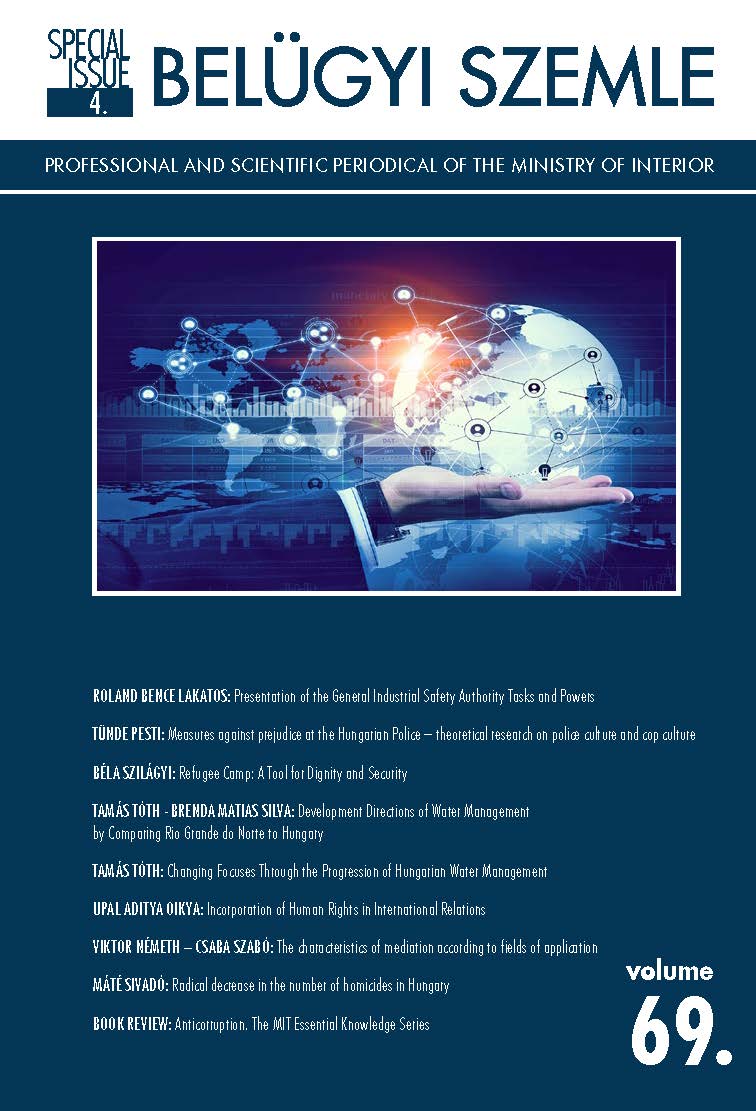Keywords
community mediation
workplace mediation
intercultural mediation
How to Cite
Abstract
Mediation has various features as being a special communicational endeavour regarding to the agreement of two or more parties in a conflicted situation. Presenting these features allows to draw the conclusion that mediation is beyond simple conflict management, thus, it has independent institutional framing both theoretically and practically. This paper reflects on the Participation Theory of Communication (PTC) as a theoretical framing, although the practical implementation stands in its main focus. By presenting all application fields of mediation – family, workplace, communal (urban), peer (school), healthcare and intercultural (minority) mediation – based on the author's personal experience as practicing mediator, the specific features of the mediation process are demonstrated.
Downloads
Similar Articles
- Péter Bányász, Echoes of a terrorist attack in social media , Academic Journal of Internal Affairs: Vol. 63 No. 10 (2015)
- Petra Ágnes Kanyuk, On the Margins of an Unfulfilled Hope? – the Abuse of Establishing Family Relationships and the Phenomenon of Migration-Related Relationships of Convenience , Academic Journal of Internal Affairs: Vol. 70 No. 3 (2022)
- Gergely Dr. Fliegauf, Eszter Dóra Várnai, Criminogenic Risk Factors and the Onset of Suicidal Intentions in Adolescents Engaging in Deliberate Self-Poisoning: Proposed Hypotheses from Psychiatric Consultation Observations. , Academic Journal of Internal Affairs: Vol. 72 No. 8 (2024)
- Zsuzsanna Borbély, Health behavior, mental health – responses of police trainees to occupational stress , Academic Journal of Internal Affairs: Vol. 67 No. 7-8 (2019)
- Erna Uricska, Online reputation management on the Instagram profile of police_hu , Academic Journal of Internal Affairs: Vol. 69 No. 9 (2021)
- Szilvia Erdeiné Késmárki-Gally Szilvia, Attila Erdei, Judit Grotte, The role of safety and security in the suburban railway traffic in the urban agglomerations of Budapest , Academic Journal of Internal Affairs: Vol. 68 No. 11 (2020)
- Tünde Pesti, The development and importance of cooperation at the Hungarian Police , Academic Journal of Internal Affairs: Vol. 71 No. 2.ksz. (2023): Special Issue
- László Bordács, Sándor Rózsa, Improving and observing inmate’s family ties , Academic Journal of Internal Affairs: Vol. 65 No. 11-12 (2017)
- Péter Kántás, Where are you going, forbidden antisocial behavior? , Academic Journal of Internal Affairs: Vol. 67 No. 6 (2019)
- László Christián, Ákos Erdős, Netnographic analysis of the social evaluation of law enforcement , Academic Journal of Internal Affairs: Vol. 70 No. 1 (2022)
You may also start an advanced similarity search for this article.
Most read articles by the same author(s)
- Csaba Szabó, Szandra Fazekas-Pátyodi, ‘Participation in research networking, building and maintaining international relationships is more important now than ever’ , Academic Journal of Internal Affairs: Vol. 72 No. 2 (2024)
- Csaba Szabó, Europol’s role in the fight against cybercrime , Academic Journal of Internal Affairs: Vol. 72 No. 9 (2024)
- Viktor Németh, The History of Regulating Mediation , Academic Journal of Internal Affairs: Vol. 70 No. 12 (2022)
- Valér Dános, Anita Varga, Csaba Szabó, About János Sallai’s book entitled The Establishment and Accreditation of Law Enforcement Science in Hungary, with special emphasis on the chapters dealing with impact of professional journals on the develo , Academic Journal of Internal Affairs: Vol. 70 No. 4 (2022)
- Valér Dános, Csaba Szabó, „A case is never over” Interview with Dr. Zoltán Bolcsik, State Secretary for Law Enforcement of Ministry of Interior , Academic Journal of Internal Affairs: Vol. 71 No. 1 (2023)
- Viktor Németh, Neuroplasticity , Academic Journal of Internal Affairs: Vol. 69 No. 6. ksz. (2021): Különszám
- Csaba Szabó, Europol’s role in the fight against cybercrime , Academic Journal of Internal Affairs: Vol. 72 No. 9 (2024)
- Viktor Németh, Critical Thinking , Academic Journal of Internal Affairs: Vol. 70 No. 2. ksz. (2022): Special Issue
- Valér Dános, Csaba Szabó, “Research has always meant a personal effect for me, feedbacks have played a secondary role only” , Academic Journal of Internal Affairs: Vol. 69 No. 9 (2021)
- Valér Dános, Csaba Szabó, ’»Speaking the Same Language« – in Fact or Metaphorically – Makes a Difference.’ , Academic Journal of Internal Affairs: Vol. 71 No. 11 (2023)

